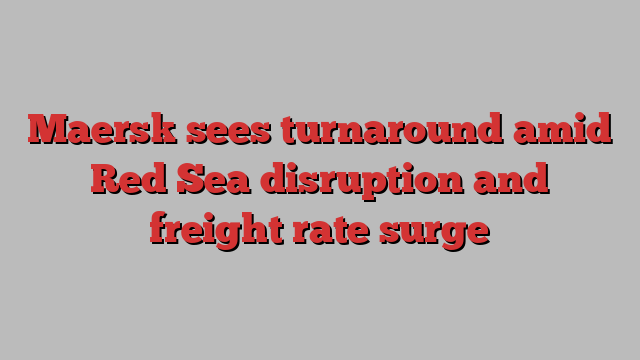
Unlock the Editor’s Digest for free
Roula Khalaf, Editor of the FT, selects her favourite stories in this weekly newsletter.
AP Møller-Maersk has lifted its financial guidance for the second time in just over a month as the disruption to global supply chains from the effective closure of the Red Sea has led to severe port congestion in Asia and the Middle East as well as big increases in freight rates.
The world’s second-largest container line now expects to make an operating profit of $1bn-$3bn against its prior forecast of a loss of up to $2bn. Up until the start of May, it had forecast an operating loss of as much as $5bn.
Attacks by Houthi rebels in Yemen have forced most container ships to divert from the Red Sea and Suez Canal route between Asia and Europe and instead take the longer journey around the Cape of Good Hope beneath South Africa, leading to delays and higher freight rates.
The update from Maersk is the latest sign of how drastically the Houthi attacks have upended global supply chains and changed the outlook for large shipowners, who until recently were expecting to struggle with an oversupply of ships as a weak global economy damped trade.
Shippers such as retailers have begun preparing for the crucial Christmas season earlier than normal, and Maersk warned of “signs of further port congestions, especially in Asia and the Middle East” as well as spot container rates that have jumped by three-quarters in the past two months.
“This development is gradually building up and is expected to contribute to a stronger financial performance in the second half of 2024,” Maersk added.
The group had been pessimistic about the large number of new vessels being delivered this year and next. Many rivals used the big boom after the initial phase of the Covid-19 pandemic to order new ships.
Maersk now expects earnings before interest, taxation and amortisation of $7bn-$9bn, up from its initial guidance of $1bn-$6bn given in February.
It cautioned: “Trading conditions remain subject to higher than normal volatility given the unpredictability of the Red Sea situation and the lack of clarity of future supply and demand.”
Maersk’s shares, which have risen by a quarter in the past month, increased by another 2 per cent on Tuesday morning.